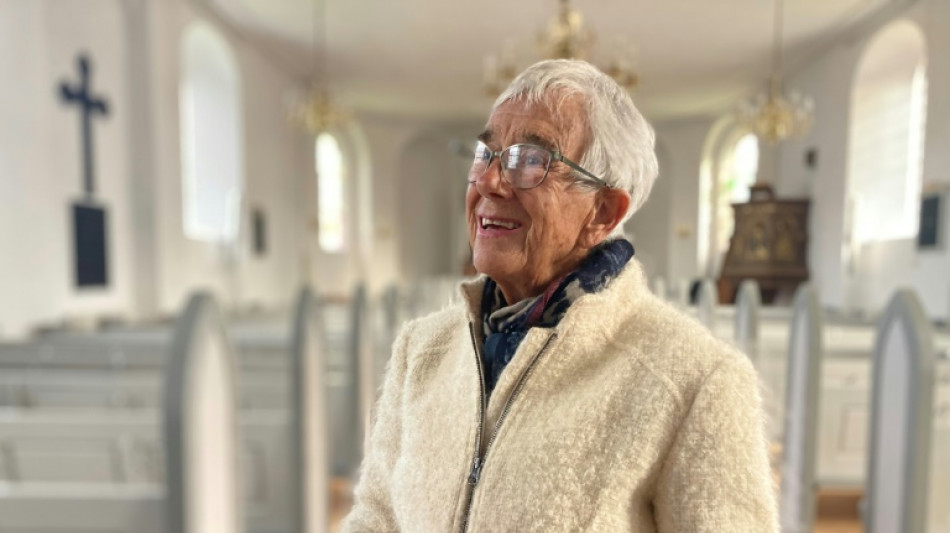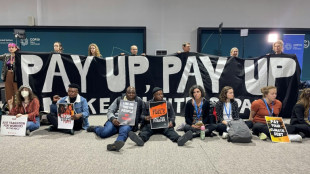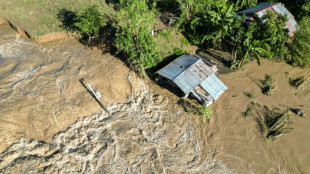
-
 US lawmaker accuses Azerbaijan in near 'assault' at COP29
US lawmaker accuses Azerbaijan in near 'assault' at COP29
-
Tuchel's England have 'tools' to win World Cup, says Carsley

-
 Federer hails 'historic' Nadal ahead of imminent retirement
Federer hails 'historic' Nadal ahead of imminent retirement
-
Ukraine vows no surrender, Kremlin issues nuke threat on 1,000th day of war

-
 Novo Nordisk's obesity drug Wegovy goes on sale in China
Novo Nordisk's obesity drug Wegovy goes on sale in China
-
Spain royals to visit flood epicentre after chaotic trip: media

-
 French farmers step up protests against EU-Mercosur deal
French farmers step up protests against EU-Mercosur deal
-
Rose says Europe Ryder Cup stars play 'for the badge' not money

-
 Negotiators seek to break COP29 impasse after G20 'marching orders'
Negotiators seek to break COP29 impasse after G20 'marching orders'
-
Burst dike leaves Filipino farmers under water

-
 Markets rally after US bounce as Nvidia comes into focus
Markets rally after US bounce as Nvidia comes into focus
-
Crisis-hit Thyssenkrupp books another hefty annual loss

-
 US envoy in Lebanon for talks on halting Israel-Hezbollah war
US envoy in Lebanon for talks on halting Israel-Hezbollah war
-
India to send 5,000 extra troops to quell Manipur unrest

-
 Sex, drugs and gritty reality on Prague's underworld tours
Sex, drugs and gritty reality on Prague's underworld tours
-
Farmers descend on London to overturn inheritance tax change

-
 Clippers upset Warriors, Lillard saves Bucks
Clippers upset Warriors, Lillard saves Bucks
-
Acquitted 'Hong Kong 47' defendant sees freedom as responsibility

-
 Floods strike thousands of houses in northern Philippines
Floods strike thousands of houses in northern Philippines
-
Illegal farm fires fuel Indian capital's smog misery

-
 SpaceX set for Starship's next flight, Trump expected to attend
SpaceX set for Starship's next flight, Trump expected to attend
-
Texans cruise as Cowboys crisis deepens

-
 Do the Donald! Trump dance takes US sport by storm
Do the Donald! Trump dance takes US sport by storm
-
Home hero Cameron Smith desperate for first win of 2024 at Australian PGA

-
 Team Trump assails Biden decision on missiles for Ukraine
Team Trump assails Biden decision on missiles for Ukraine
-
Hong Kong court jails 45 democracy campaigners on subversion charges

-
 Several children injured in car crash at central China school
Several children injured in car crash at central China school
-
Urban mosquito sparks malaria surge in East Africa

-
 Djibouti experiments with GM mosquito against malaria
Djibouti experiments with GM mosquito against malaria
-
Pulisic at the double as USA cruise past Jamaica

-
 Many children injured after car crashes at central China school: state media
Many children injured after car crashes at central China school: state media
-
Asian markets rally after US bounce as Nvidia comes into focus

-
 Tens of thousands march in New Zealand Maori rights protest
Tens of thousands march in New Zealand Maori rights protest
-
Five takeaways from the G20 summit in Rio

-
 China, Russia ministers discuss Korea tensions at G20: state media
China, Russia ministers discuss Korea tensions at G20: state media
-
Kohli form, opening woes dog India ahead of Australia Test series

-
 Parts of Great Barrier Reef suffer highest coral mortality on record
Parts of Great Barrier Reef suffer highest coral mortality on record
-
Defiant Lebanese harvest olives in the shadow of war

-
 Russian delegations visit Pyongyang as Ukraine war deepens ties
Russian delegations visit Pyongyang as Ukraine war deepens ties
-
S.Africa offers a lesson on how not to shut down a coal plant

-
 Italy beat Swiatek's Poland to reach BJK Cup final
Italy beat Swiatek's Poland to reach BJK Cup final
-
Japan, UK to hold regular economic security talks

-
 Divided G20 fails to agree on climate, Ukraine
Divided G20 fails to agree on climate, Ukraine
-
Can the Trump-Musk 'bromance' last?

-
 US to call for Google to sell Chrome browser: report
US to call for Google to sell Chrome browser: report
-
Macron hails 'good' US decision on Ukraine missiles

-
 Italy eliminate Swiatek's Poland to reach BJK Cup final
Italy eliminate Swiatek's Poland to reach BJK Cup final
-
Trump expected to attend next Starship rocket launch: reports

-
 Israeli strike on Beirut kills 5 as deadly rocket fire hits Israel
Israeli strike on Beirut kills 5 as deadly rocket fire hits Israel
-
Gvardiol steals in to ensure Croatia reach Nations League quarter-finals


80 years on, Danish Jewish girl recalls life in hiding
In October 1943 Tove Udsholt, who had just turned three, had fled Copenhagen with her mother to escape the Gestapo. She ended up alone, but a small fishing village took her in.
Around 95 percent of Denmark's 7,000 Jews escaped deportation, either by fleeing to neighbouring neutral Sweden by boat or, for around 150 children like Udsholt, by hiding in Denmark.
Many children were reunited with their loved ones after the country was liberated at the end of World War II.
Udsholt however, chose to stay in Gilleleje, the small village north of Copenhagen that adopted her. And years later, she would return there to retire.
Occupied by Nazi Germany in April 1940, Denmark chose to collaborate with the Nazis and maintained its own institutions until the end of the summer of 1943.
Danish Jews, who did not have to wear the yellow star Jews were forced to wear by the Nazis, were not at first worried.
But everything changed at the end of September 1943, when Berlin ordered a raid on the country's Jewish community.
The information was leaked and Denmark's Jews knew they had to act.
"My mother told me she had received a message on September 30 that she would have to flee with me," Udsholt told AFP in Gilleleje.
"Since my father was Christian he didn't have to come."
It was the first of several separations, and one which was never mended.
- Gestapo raid -
Carrying just one bag, Udsholt and her mother met up with most of her mother's side of the family at Copenhagen's train station.
Together they took the train to Gilleleje, a village facing the Swedish coast, where they were hidden away in a hay barn while waiting to make the crossing to Sweden.
But Udsholt's mother was concerned that her daughter's incessant chatter would get them caught.
A local fisherman, Svend Andreasen, took a liking to the talkative little girl.
From time to time, he offered to take her home to his wife for a few hours so she could play freely and escape the confined, chilly space.
He and his wife Ketty later offered to let the little girl stay with them so her mother, Paula Mortensen, could find a place for them to live in Sweden.
The Gestapo found and arrested 86 Jews stowed away in a Gilleleje church barn, which had until then turned a blind eye to the influx of refugees in the village.
Fearing an imminent raid, Mortensen had to act quickly.
"She told herself: 'This is what is best for my daughter'," Udsholt told AFP.
"I started to cry, I still remember," recalled the vivacious 83-year-old.
"At this moment I'm totally alone. I don't really know these people."
But Andreasen and his wife, both in their 40s and with no children, quickly gained the little girl's confidence.
From their modest home, they could see the Swedish coast.
They "told me: 'You see those lights over there, that's your mother'", said Udsholt.
"Holding my cuddly toy, I looked, and ... throughout the rest of the war, in the evenings I would stand on a chair in the window and tell my mother what I did that day."
- 'Good friends' -
The weeks passed and Udsholt blossomed, protected by the villagers.
Andreasen "went around to most homes to tell them they had taken in a little fair-haired girl. That was my saving grace, because no one knew I was Jewish."
As soon as soldiers approached when she was playing outdoors, villagers would call her to come inside.
"I was afraid (of the Germans), because Svend had warned me that I was never to talk to the men dressed in green or those with long black coats because those were the people who were going after my mother," she recalled.
When Denmark was liberated in May 1945, Udsholt's mother, who had had no contact with her daughter for almost two years, returned.
She came to collect her child on August 24 -- her fifth birthday.
But back in Copenhagen, Udsholt missed the sea air and village life.
The time apart took its toll on her parents, who never reunited. Udsholt ended up living with her mother, and the two fought a lot.
Finally, when she was seven, her mother agreed to let her go live in Gilleleje with Svend and Ketty Andreasen, who formally adopted her at age 18.
"My mother and I were good friends for most of her life, but we were not mother and daughter," she said with a heavy sigh.
A.Williams--AT



